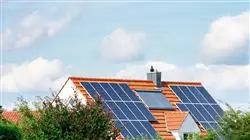University certificate
Scientific endorser

The world's largest faculty of engineering”
Introduction to the Program
Learn how to incorporate new energy-efficient and sustainable systems in the construction of buildings in a Masters Degree created to boost your professional capacity’’

The Masters Degree in Energy Efficiency and Sustainability in the Construction of Buildings addresses the complete range of issues involved in this field, both in the residential and tertiary sectors. Studying this course will give students a clear advantage over students who study other programs that focus on specific blocks, which prevents the student from knowing the interrelationship with other areas included in the multidisciplinary field of Energy Efficiency and Sustainability in the Construction of Buildings.
This up-to-date program incorporates a module dedicated to the circular economy within the building sector with which to quantify not only the energy impact, but also the environmental impact.
Additionally, there is a module that analyzes the different types of control, automation and networks that can be used to increase the potential of energy efficiency proposals.
Together with the rest of the modules on facilities and architecture, it offers a global and interrelated vision of topics in the field of Energy Efficiency and Sustainability in the Construction of Buildings, which makes it unique. It is essential for professionals to complete this Masters Degree in order to reach their full potential in this area.
By completing and passing the assessments of this program, the students will obtain sound knowledge of the rules and regulations to be applied in relation to energy efficiency and sustainability in construction. They will be able to master their understanding of energy, bioclimatic architecture, renewable energies and building installations, such as electrical, thermal, lighting and control.
Furthermore, students will give their professional career a great boost by being able to lead the transformation in terms of circular economy and successfully carry out energy audits and certification processes in the building sector.
Moreover, as this is a 100% online Masters Degree, the student is not conditioned by fixed schedules or the need to move to another physical location, but can access the contents at any time of the day, balancing their work or personal life with their academic life.
Acquire the most comprehensive and up-to-date knowledge in terms of standards and applicable regulations in a convenient and flexible way’’
This Masters Degree in Energy Efficiency and Sustainability in the Construction of Buildings contains the most complete and up-to-date program on the market. The most important features include:
- The development of practical cases presented by experts in Energy Efficiency and Sustainability in the Construction of Buildings
- The graphic, schematic, and practical contents with which they are created provide scientific and practical information on the disciplines that are essential for professional development
- Practical exercises where self-assessment can be used to improve learning
- Special emphasis on innovative methodologies in Energy Efficiency and Sustainability in the Construction of Buildings
- Theoretical lessons, questions to the expert, debate forums on controversial topics, and individual reflection work
- Content that is accessible from any fixed or portable device with an internet connection
The most innovative and interesting aspects of energy, bioclimatic architecture, renewable energies and building installations in an intensive, high-quality program’’
A teaching staff of experts in the field of building construction contributes the experience of their work to this program, in addition to recognized specialists from leading companies and prestigious universities.
Its multimedia content, developed with the latest educational technology, will allow the professional a situated and contextual learning, that is, a simulated environment that will provide an immersive experience programmed for learning in real situations.
This program is designed around Problem-Based Learning, whereby the professional must try to solve the different professional practice situations that arise throughout the program. For this purpose, the professional will be assisted by an innovative interactive video system, developed by renowned and experienced experts in Energy Efficiency and Sustainability in the Construction of Buildings.
With comprehensive educational material supported by the best audiovisual systems on the educational market, providing you with an immersive learning experience"

A 100% online Masters Degree that will allow you to balance your studies with your professional work with maximum organizational flexibility"
Why study at TECH?
TECH is the world’s largest online university. With an impressive catalog of more than 14,000 university programs available in 11 languages, it is positioned as a leader in employability, with a 99% job placement rate. In addition, it relies on an enormous faculty of more than 6,000 professors of the highest international renown.

Study at the world's largest online university and guarantee your professional success. The future starts at TECH”
The world’s best online university according to FORBES
The prestigious Forbes magazine, specialized in business and finance, has highlighted TECH as “the world's best online university” This is what they have recently stated in an article in their digital edition in which they echo the success story of this institution, “thanks to the academic offer it provides, the selection of its teaching staff, and an innovative learning method aimed at educating the professionals of the future”
A revolutionary study method, a cutting-edge faculty and a practical focus: the key to TECH's success.
The most complete study plans on the university scene
TECH offers the most complete study plans on the university scene, with syllabuses that cover fundamental concepts and, at the same time, the main scientific advances in their specific scientific areas. In addition, these programs are continuously being updated to guarantee students the academic vanguard and the most in-demand professional skills. In this way, the university's qualifications provide its graduates with a significant advantage to propel their careers to success.
TECH offers the most comprehensive and intensive study plans on the current university scene.
A world-class teaching staff
TECH's teaching staff is made up of more than 6,000 professors with the highest international recognition. Professors, researchers and top executives of multinational companies, including Isaiah Covington, performance coach of the Boston Celtics; Magda Romanska, principal investigator at Harvard MetaLAB; Ignacio Wistumba, chairman of the department of translational molecular pathology at MD Anderson Cancer Center; and D.W. Pine, creative director of TIME magazine, among others.
Internationally renowned experts, specialized in different branches of Health, Technology, Communication and Business, form part of the TECH faculty.
A unique learning method
TECH is the first university to use Relearning in all its programs. It is the best online learning methodology, accredited with international teaching quality certifications, provided by prestigious educational agencies. In addition, this disruptive educational model is complemented with the “Case Method”, thereby setting up a unique online teaching strategy. Innovative teaching resources are also implemented, including detailed videos, infographics and interactive summaries.
TECH combines Relearning and the Case Method in all its university programs to guarantee excellent theoretical and practical learning, studying whenever and wherever you want.
The world's largest online university
TECH is the world’s largest online university. We are the largest educational institution, with the best and widest online educational catalog, one hundred percent online and covering the vast majority of areas of knowledge. We offer a large selection of our own degrees and accredited online undergraduate and postgraduate degrees. In total, more than 14,000 university degrees, in eleven different languages, make us the largest educational largest in the world.
TECH has the world's most extensive catalog of academic and official programs, available in more than 11 languages.
Google Premier Partner
The American technology giant has awarded TECH the Google Google Premier Partner badge. This award, which is only available to 3% of the world's companies, highlights the efficient, flexible and tailored experience that this university provides to students. The recognition as a Google Premier Partner not only accredits the maximum rigor, performance and investment in TECH's digital infrastructures, but also places this university as one of the world's leading technology companies.
Google has positioned TECH in the top 3% of the world's most important technology companies by awarding it its Google Premier Partner badge.
The official online university of the NBA
TECH is the official online university of the NBA. Thanks to our agreement with the biggest league in basketball, we offer our students exclusive university programs, as well as a wide variety of educational resources focused on the business of the league and other areas of the sports industry. Each program is made up of a uniquely designed syllabus and features exceptional guest hosts: professionals with a distinguished sports background who will offer their expertise on the most relevant topics.
TECH has been selected by the NBA, the world's top basketball league, as its official online university.
The top-rated university by its students
Students have positioned TECH as the world's top-rated university on the main review websites, with a highest rating of 4.9 out of 5, obtained from more than 1,000 reviews. These results consolidate TECH as the benchmark university institution at an international level, reflecting the excellence and positive impact of its educational model.” reflecting the excellence and positive impact of its educational model.”
TECH is the world’s top-rated university by its students.
Leaders in employability
TECH has managed to become the leading university in employability. 99% of its students obtain jobs in the academic field they have studied, within one year of completing any of the university's programs. A similar number achieve immediate career enhancement. All this thanks to a study methodology that bases its effectiveness on the acquisition of practical skills, which are absolutely necessary for professional development.
99% of TECH graduates find a job within a year of completing their studies.
Master's Degree in Energy Efficiency and Sustainability in the Construction of Buildings
Sustainable development has become a defining paradigm in architecture, engineering, and all sectors linked to urbanization and energy-consuming infrastructures. It is no longer an optional approach—the current environmental crisis demands it. Committed to both social responsibility and the evolving needs of the industry, TECH Global University offers the Master’s Degree in Energy Efficiency and Sustainability in the Construction of Buildings, an online postgraduate program supported by the latest digital and methodological advances in academic learning. Across ten comprehensive modules, this program explores key subjects such as renewable energy, circular economy, thermal installations, and bioclimatic architecture. Students will enhance their professional profile in alignment with emerging business models where sustainability and energy efficiency play a decisive role. If you aim to expand your career opportunities, engage in meaningful environmental initiatives, and lead innovative projects, TECH Global University is your ideal partner. You will learn from an outstanding faculty and benefit from a prestigious, flexible multimedia learning system.
Advance your career through sustainable construction
If climate change is today’s global challenge, energy efficiency is the key to restoring balance. This is evident in numerous projects developed by both government and private organizations worldwide. The United Nations Sustainable Development Goals (SDGs), framed within the 2030 Agenda, also move in this direction. The construction sector cannot remain indifferent, as studies show that buildings account for up to 40% of global energy consumption. In this context, our Master’s Degree provides a decisive advantage for professionals who aspire to stand out in a competitive and evolving market. Would you like to learn about climate zoning, energy auditing, CO₂ emission reduction plans, biomass systems, or LED technology? Through our flexible, self-paced online classes based on the Relearning methodology, you will acquire these skills efficiently and interactively. Enroll today and illuminate not only buildings—but your own professional future as well.







